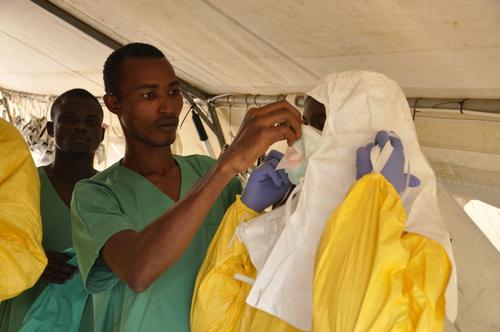Mariano Lugli is the Médecins Sans Frontières (MSF) emergency coordinator for the response to the Ebola outbreak in Guinea. In this interview, he describes the measures that have been put in place to combat the spread of the disease.
“I arrived in Guéckédou, where the outbreak started, two weeks ago. The situation there was confused, the cases hadn’t yet been confirmed, but everything pointed to it being Ebola. So we put in place protective measures to ensure our security from the very beginning.
Reduce panic The first thing we did was to try and reduce the panic among health staff, who are often the first to be affected by the disease. Health workers in the hospital in Guéckédou were affected, as were four doctors in Conakry. When an outbreak happens, a lot of medical staff flee because they are afraid – in Guéckédou, the patients were left completely alone for two or three days. So even before the confirmation of the Ebola outbreak, we immediately ran sessions with as many nurses and doctors as possible to explain how to put infection control measures in place in hospitals in order to protect themselves.
Constructing an isolation ward
There was a lot to do in a very short time: constructing an isolation ward for the patients – which we did in two days – and establishing infection control in the hospital. Next we had to identify those people who had had contact with the patients, and follow them for 21 days – if they had no symptoms during this time, they could be declared non-contaminated. We also started epidemiological surveillance, organised ‘sensitisation’ activities with the local media to give basic information to the general population, and at the same time set up outreach teams to identify patients and bring them to the isolation wards. Only by putting all these activities in place rapidly can you hope to contain the epidemic.
I was supposed to be there for just ten days, but on my way back to Conakry, they told me that cases had been confirmed in the capital, and so I stayed on. As emergency coordinator, I spent a lot of time in meetings, but when I had time I would help the medical team inside the isolation ward take blood samples and keep up the morale of the staff.
‘You cannot make mistakes’ It’s very stressful working in this situation, because you know the disease, you know what the risks are, you know you cannot make mistakes, and you need to stay focused all of the time. At the same time, you are stretched in terms of human resources and so you are tired. At the beginning the team was getting up at two and three in the morning to do rounds in the isolation ward.
I think of it really like an operation in a war zone – there is immense solidarity between the team members; everybody tries to help each other. To have to dress up in protective clothing, to go into the isolation ward, to look for patients in the countryside, it’s very stressful for everyone involved – but in terms of solidarity between people, it is very positive.
Psychologists help patients
There’s a lot of stigma attached to Ebola, so we have psychologists who help the patients and their families. Putting someone in isolation is a big decision, and it is especially difficult with the patients that are borderline in terms of their symptoms and their contact history with infected patients. So we set up separate zones within the isolation ward for confirmed cases and those who had not yet had the infection confirmed by laboratory test. Now a laboratory is in place that can test in 12 hours whether or not people have the disease.
I arrived back home yesterday. My wife is a paediatric nurse, and she worked in Liberia during an outbreak of Lassa haemorrhagic fever, so she understands. I haven’t dared tell my parents yet where I’ve been – but tomorrow it’s going to be all over the Italian media, so I’m going to have to tell them soon.”



